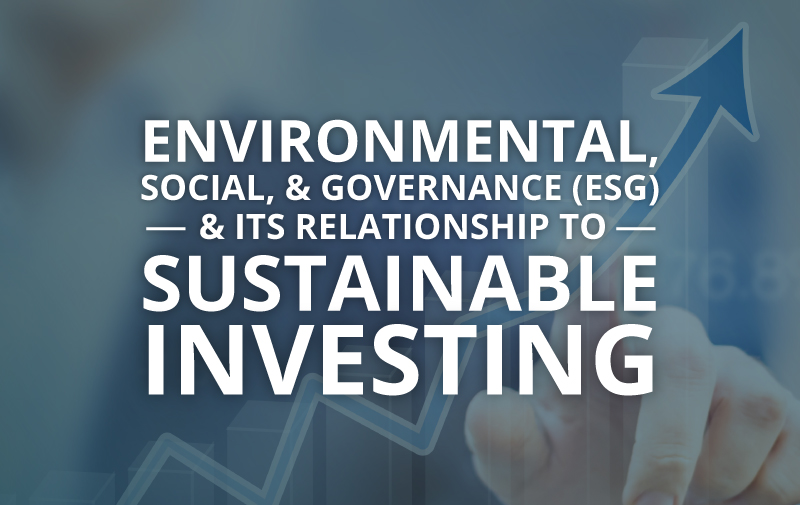The importance of Environmental, Social and Governance, or ESG, is on the rise. But do you know how ESG relates to corporate social responsibility, or what it means for companies? In this article, we’ll explain ESG and how you can leverage it for sustainable investing.
Understanding ESG
ESG is the systematic integration of non-financial factors into the investment process. These factors are based on the notion that environmental, social and governance issues can affect the performance of investment portfolios and should therefore be considered alongside more traditional financial factors.
Here’s a breakdown of the three non-financial components:
- Environmental: Describes how a company performs as steward of the natural environment
- Social: Examines how a company manages relationships with its stakeholders (i.e. supply chain risk, labor, etc.)
- Governance: Relates to a company’s leadership, executive pay, shareholder rights, audits and internal controls (i.e. diversity, sexual harassment, etc.)
How does ESG differ from Corporate Social Responsibility?
Corporate social responsibility (CSR) refers to a company’s initiatives to evaluate and accept responsibility for their effect on all stakeholders. CSR is about self-regulation, rather than legal compliance, and directs a company’s guiding principles and operating philosophy. Simply put, CSR refers to the socially responsible behaviors of a company, whereas ESG refers to the criteria used to evaluate a company’s commitment to its CSR principles.
The Importance to Investors
You may be wondering why investors should care about ESG. There is growing evidence suggesting that ESG factors, when integrated into investment analysis and portfolio construction, may offer investors potential long-term performance advantages. The incorporation of ESG factors into an investment practice is referred to as sustainable investing.
Because of this, investors need to take a close look at ESG factors when pursuing sustainable investments, which rose 33% in the U.S. between 2014 and 2016. Morgan Stanley recently issued a comprehensive report on sustainable investing. Key findings included the following data points:
- Three in four U.S. asset managers say their firms now offer sustainable investing strategies, up from 65% in 2016.
- Asset managers overwhelmingly agree that sustainable investing is no longer a fad, with nine in 10 (89%) saying it is here to stay and 63% expecting it to continue to grow in the next five years.
- 82% think strong ESG practices can lead to higher profitability and that companies with such practices may be better long-term investments.
- Almost two-thirds of asset managers (62%) believe that it’s possible to maximize financial returns while investing sustainably.
- Many employ a full spectrum of sustainable investing approaches, with 63% employing more than one strategy across shareholder engagement, restriction screening, ESG integration, thematic investing and impact investing.
- Nearly all (89%) respondents report their firms will devote more resources to sustainable investing in the next two years. Common strategies for developing in-house skills and capacity include employee training (41%), dedicating more employee time (36%) and specialist hires (34%).
In light of that data, investors should consider sustainable investments integrating ESG factors.
How to Approach ESG from a Governance and Outreach Perspective?
Investors want clarity and transparency, making it imperative to clearly communicate ESG factors by developing inclusive, rigorous, and substantial messaging and reports.
The Sustainability Accounting Standards Board (SASB) was established in 2011 as an independent, private-sector standards-setting organization. SASB develops and maintains sustainability accounting standards for 79 industries in 11 sectors that help public corporations disclose financially material information to investors in a cost-effective and decision-useful format. Despite this oversight, the previously referenced Morgan Stanley report found that seven in 10 asset managers agree that the industry lacks standard metrics to measure the nonfinancial performance of sustainable investments. There is ample greenfield ahead for better data and the development of impact measurement tools.
In closing, the message is clear: sustainable investing has gone mainstream and U.S. asset managers will be spending even more time researching these investments in the near future. If you would like to learn more about EGS and sustainable investing, contact the team at Gilmartin Group today!
Carrie Mendivil, Principal


Leave a Reply